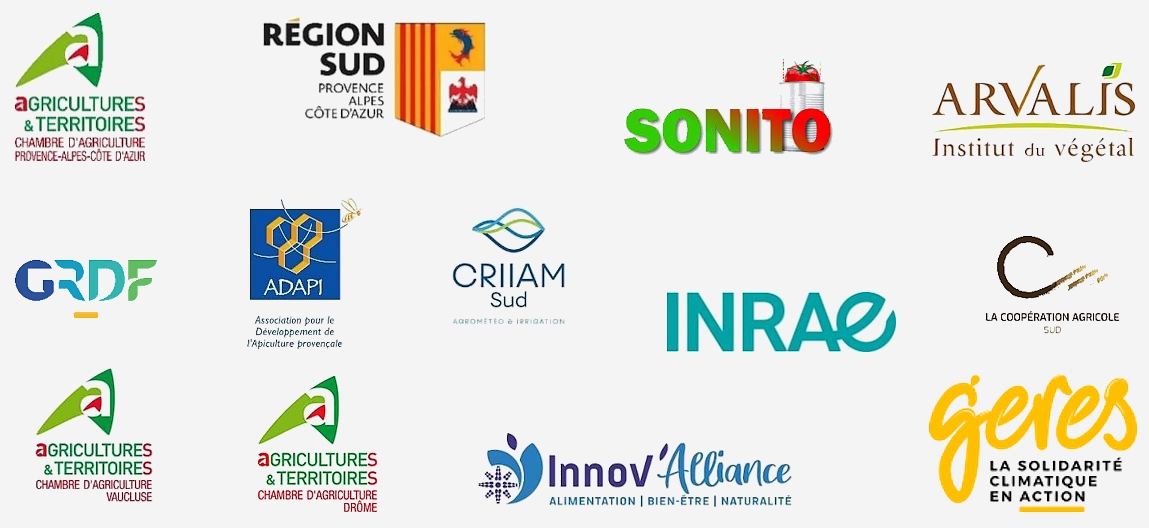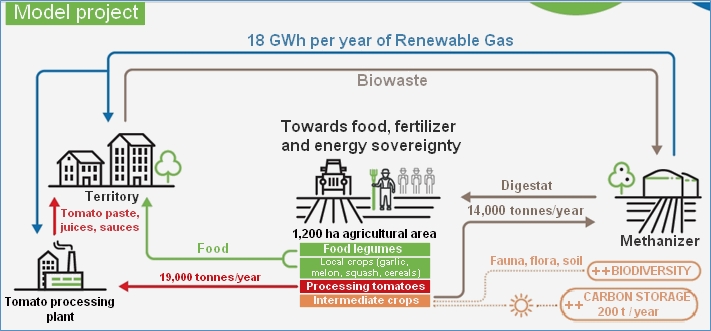Press release
, François-Xavier Branthôme
"TOMMATES" is the new acronym for "Techniques, Outils et Méthanisation pour la Multiperformance Agricole des Territoires et des Systèmes" [Techniques, tools, and methanization for the agricultural multiperformance of territories and systems]. The official launch of the TOMMATES project, winner in May 2023 of the France 2030 investment plan, took place on Tuesday, September 12, at the Panier Provençal factory in Tarascon.
Multiperformance means that a specific agricultural site is able to achieve a given performance in economic, environmental, technical and social terms. Several questions underlie this definition: What technical combinations can improve agricultural production systems? What are the benefits for growers? What is the best compromise between profitability, biodiversity and climate change mitigation?
In 1985, the annual French crop amounted to 400,000 tonnes of raw tomatoes, whereas today it stands at around 150,000 tonnes. The French tomato industry covers just over 10% of national needs, making the French market highly dependent on imports. Over the past five years, on average, the main suppliers to the French market have been Italy (59% of French purchases of paste, 64% of canned tomatoes and 32% of sauces), Spain (26% of paste, 26% of canned tomatoes and 46% of sauces) and, to a lesser extent, Portugal, Tunisia, Turkey, Morocco and Greece.
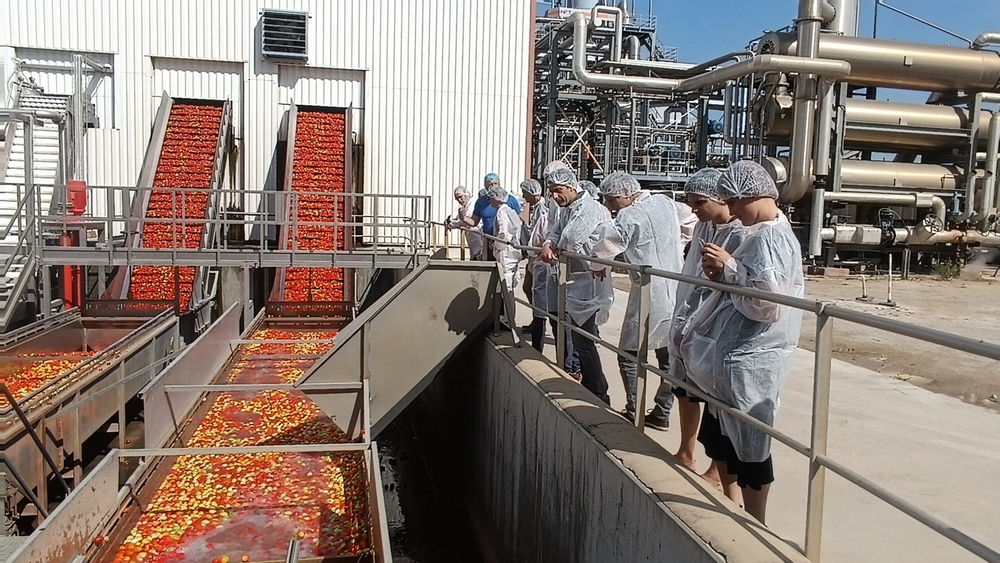
The President of the Regional Chamber of Agriculture, Mr. André Bernard, who is also President of the interbranch organization SONITO (Société Nationale Interprofessionnelle de la Tomate), insists on the need to relaunch this sector, in a broader context: "We absolutely must re-boost this sector, move it forward. Our objective is to reach 25% of consumption coverage (10% today) in raw tomato equivalent by 2030, which means processing 350,000 tonnes instead of the current 190,000 tonnes."
In front of an assembly gathered at the Panier Provençal processing plant, owned since 2019 by the Groupe CAPL (Coopérative Agricole Provence Languedoc) and one of France's largest plants for processing tomatoes into coulis, juice, paste, sauces, purée and pulp, André Bernard explained: "With this TOMMATES Project, we're moving towards new production models with the creation of 1,000 to 1,500-hectare islands of tomato plots that should correspond to the many expectations with which agriculture must comply. To achieve this, we would need to build two additional processing plants, each capable of producing 80,000 tonnes per year. But with the current constraints on the price of raw materials and the explosion in energy prices, we need to think about another model of agriculture that is more global and sustainable. Instead of concentrating on its own development in isolation, our industry has already joined forces with rice, wheat and legumes from Lyon to the Camargue, following the banks of the Rhône Valley. Our idea is to develop field tomato cultivation along with other crops."
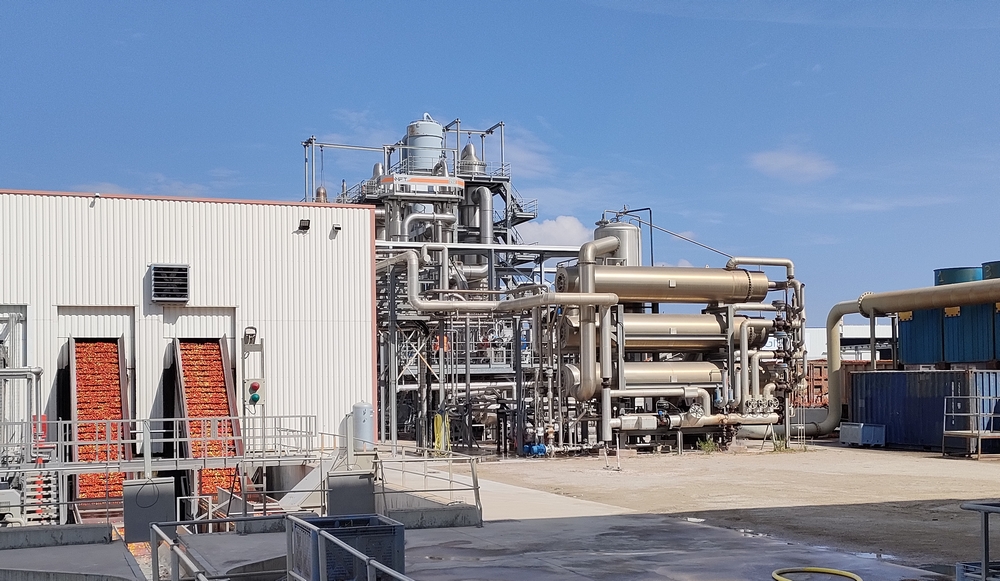
The TOMMATES project was born from several observations:
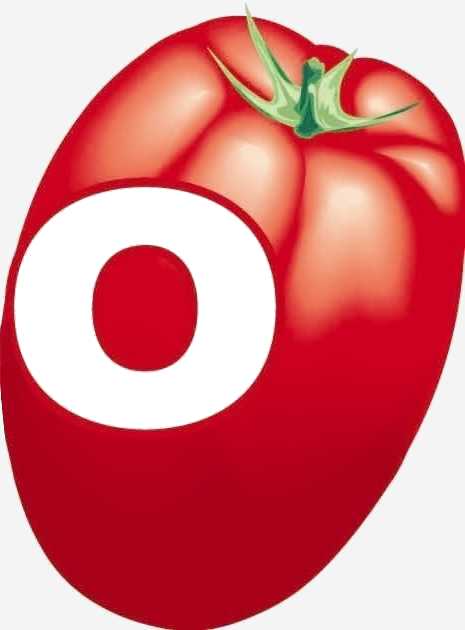 Production of tomatoes for industrial processing has fallen sharply over the last thirty years, and today accounts for only 10% of our national needs.
Production of tomatoes for industrial processing has fallen sharply over the last thirty years, and today accounts for only 10% of our national needs. Studies have shown that the development and consolidation of food chains depends on the diversification of regional production, and that to accelerate the transition of the system, it is necessary to commit to an agro-ecological transition approach, facilitating the emergence of grower interest groups and structuring the industries with optimized local logistics.
Studies have shown that the development and consolidation of food chains depends on the diversification of regional production, and that to accelerate the transition of the system, it is necessary to commit to an agro-ecological transition approach, facilitating the emergence of grower interest groups and structuring the industries with optimized local logistics. In parallel, the Provence-Alpes-Côte d'Azur region is committed to significantly increasing the production of renewable energy from biomass.
In parallel, the Provence-Alpes-Côte d'Azur region is committed to significantly increasing the production of renewable energy from biomass. At the same time, new agricultural regulations are strongly encouraging growers to introduce plant cover crops, to better preserve the biodiversity of agricultural soils and wildlife while optimizing water resources.
At the same time, new agricultural regulations are strongly encouraging growers to introduce plant cover crops, to better preserve the biodiversity of agricultural soils and wildlife while optimizing water resources.
This is why twenty organizations have joined forces to launch the TOMMATES project, led by the Provence Alpes Côte d'Azur Regional Chamber of Agriculture, and co-piloted by the South Provence Alpes Côte d'Azur Region, which aims to be a Territorial Demonstration hub responding to the challenges of food, climate and societal transition.
The idea is to define and set up agricultural production islands in the Rhone valley where a coordinated approach will be implemented including processing tomato crops, food legumes (currently booming to provide plant proteins for an ever-increasing number of consumers), and intermediate crops to feed a methanization unit, while retaining local crops in crop rotations (seed production in the Drôme, vegetables in the Vaucluse and rice in Camargue).
The benefits of this model are manifold. It will facilitate crop rotation and therefore weed reduction, while contributing to carbon neutrality. It has been demonstrated that covering the soil with intermediate crops leads to the capture of carbon, part of which is stored in the soil via the root system. Furthermore, these intermediate crops contribute to preserving the biodiversity, serving as a refuge for the small fauna of the flatlands (partridge, pheasant, hare, etc.) and feeding bees thanks to melliferous crops.
In addition, spreading the digestate from the methanization process will bring carbon back into the soil, fertilizing and amending it, and even bringing in additional carbon by methanizing local biowaste as well. Because this model will be part of a truly territorial approach, with the treatment of local bio-waste and the production of locally-produced renewable gas, there will be an undeniable benefit at the national level: an increase in our energy independence, which is a highly topical issue.
It should also be taken into account that the gas produced will not only provide farmers with additional income thanks to its resale, but it will also supply energy to industrial tomato processing sites and local residents, as well as to farmers' tractors. In this way, the circular economy comes full circle with a genuine industrial and territorial ecology approach and with projects that combine food, fertilizer and energy sovereignty.
This agricultural model will be designed, tested, validated and deployed with farmers and all stakeholders in order to implement agro-ecological and energy transition solutions from multi-efficient agricultural systems, based on existing decision support tools that will be adapted to the TOMMATES project.
The project is based around a farmland area of approximately 1,200 ha, with crop rotations adapted to the region and the construction of a nearby methanization site. With seven projects of this type, a large half of which could be located within the three main tomato-producing départements, French processing tomato production could be doubled.
The processing tomato sector is already working hard to promote its advantages to the Senate's Economic Affairs Committee, which has already become acquainted with the project, now entering its maturation phase. A bill could be drafted to support the industry's competitiveness.
Pragmatic and determined, André Bernard concluded, "We need to adapt to climate change by optimizing the use of water resources, limiting inputs, respecting the environment and strengthening our food and energy sovereignty."
Sources: SONITO, pleinchamp.com, echodumardi.com




 Production of tomatoes for industrial processing has fallen sharply over the last thirty years, and today accounts for only 10% of our national needs.
Production of tomatoes for industrial processing has fallen sharply over the last thirty years, and today accounts for only 10% of our national needs.